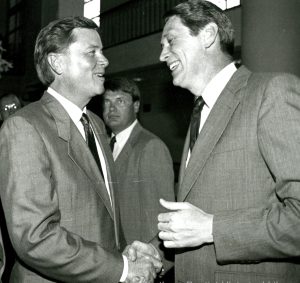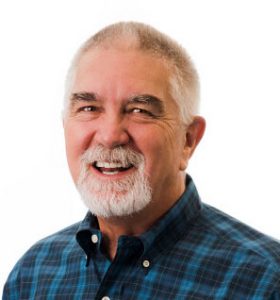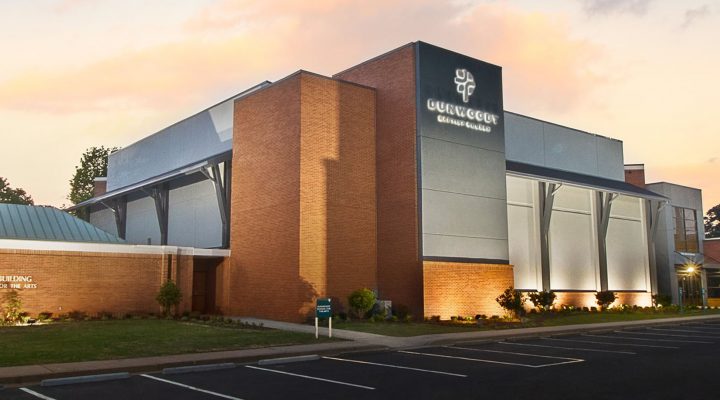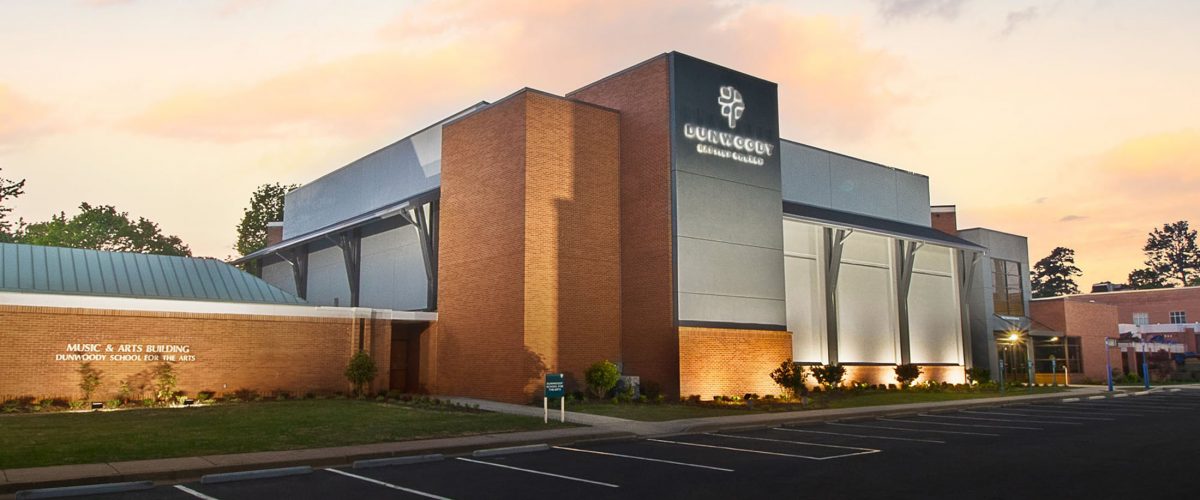Struggling against the powers that be in the Southern Baptist Convention is nothing new to Dunwoody Baptist Church in North Atlanta.
In 1989 and 1990 when he ran as the last “moderate” candidate in the SBC presidential race, Daniel Vestal was pastor at Dunwoody. Vestal, who later became executive coordinator of the breakaway Cooperative Baptist Fellowship, was defeated in 1989 by Florida pastor Jerry Vines and in 1990 by Texas pastor Morris Chapman. Both those successful candidates were supported by the “conservative resurgence” that was sweeping the SBC rightward.

Daniel Vestal (right) congratulating Morris Chapman, who defeated him in the race for SBC president in 1990. (Southern Baptist Historical Library and Archives)
Until 2018, Dunwoody was dually aligned with the SBC and CBF — a common situation for churches with diverse congregations. But now the church is singly aligned with the SBC. (In 2018, CBF adopted its Illumination Project report that made space, in certain circumstances, for the inclusion of LGBTQ Christians.)
And now, the North Atlanta church faces another crossroads. This week’s second vote on a proposed SBC constitutional amendment, called the Law Amendment, would put Dunwoody at odds with the SBC once again. The church employs a female children’s pastor.
If the Law Amendment passes on second reading, Dunwoody likely would be reported to the SBC Credentials Committee and expelled from the denomination.
The church’s current pastor, Allen Jackson, was youth minister at the church when Vestal was pastor. The former professor at the SBC’s New Orleans Baptist Theological Seminary went on to serve Dunwoody twice as interim pastor before eventually becoming the full-time pastor.
Dunwoody is a northern suburb of Atlanta located just above what locals call The Perimeter. It is an affluent area that grew up from the roots of a small town engulfed by Metro Atlanta.
“We were founded right after the Civil War as the First Baptist Church of Dunwoody,” Jackson explained. “The church disbanded in the early ’60s and reformed as Dunwoody Baptist Church. it would be fair to say we’ve always been a church that was a little contrarian.
“Even in 1964, the founding pastor told the congregation he wouldn’t come unless they allowed membership to African Americans.”
Because of having a female on staff with the title “pastor,” Dunwoody was among 170 churches targeted by Virginia pastor Mike Law, author of the proposed amendment, when he published detailed information — including photos and maps — of those he considered to be offending female pastors.

Allen Jackson
Jackson said he understands people are “passionate about the way they interpret certain passages of Scripture,” but those differences shouldn’t exclude a church like Dunwoody.
“To determine what Scripture is contextual, particularly in Paul’s writings, is a challenge for people who study the Scriptures,” the former professor said. “People with a whole lot of integrity have landed on both sides of this issue as they have with many issues, especially in Baptist world. “
Jackson calls himself a “soft complementarian.” He tends to believe the root of this issue is political more than theological.
“The roots roughly parallel our times politically,” he said. “We have a lot of fear in our culture. And in this issue, there is a fear that a militant feminism has influenced the life of the church. The basis of that is what some would call the explosion of women as pastors.”
In Dunwoody’s history, there have been two women with the title of pastor, both having served as children’s pastors. Both have spoken to the congregation in Sunday morning worship.
Jackson says his church is unified on supporting these women and doesn’t plan on changing its position. He was planning on retiring but has decided to stay until the end of 2025 to help guide the church through whatever comes next.
“As our search team began to talk to pastors, they needed clarity about what they would be getting into, in knowing if we were going to even be a Southern Baptist church,” he explained. “It was important for them to be able to provide that answer to potential candidates. So, as this amendment began getting traction, I decided to stay until the Law Amendment was figured out.”
That decision will come this week. And win or lose, Jackson grieves the state of the denomination he has called home.
“I’ve reached out to several of my friends. They’re a little bit in shock as to how it came to this. I have a lot of respect for people who feel like they’re guarding the integrity of the Bible. I just don’t happen to agree with the interpretation that they’ve arrived at,” he said. “I grieve over this because I wish this was an issue we could talk about rather than to divide a great convention. I don’t think we want to be known as the convention that looks for churches to exclude, but that’s sort of what has become of the denomination.”
Disclaimer: BNG Executive Director Mark Wingfield was a member of Dunwoody Baptist Church from 1988 to 1991, a time period central to this article.
Related articles:
This is what support looks like: The First Baptist Richmond story
Second vote on Law Amendment will take the spotlight at this summer’s SBC annual meeting


